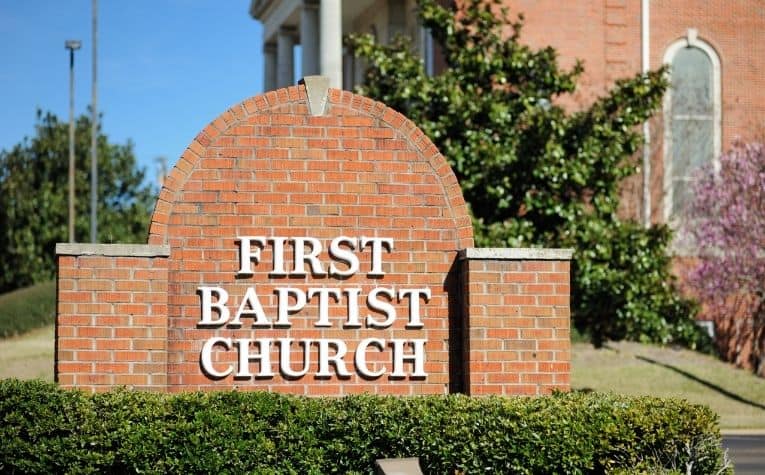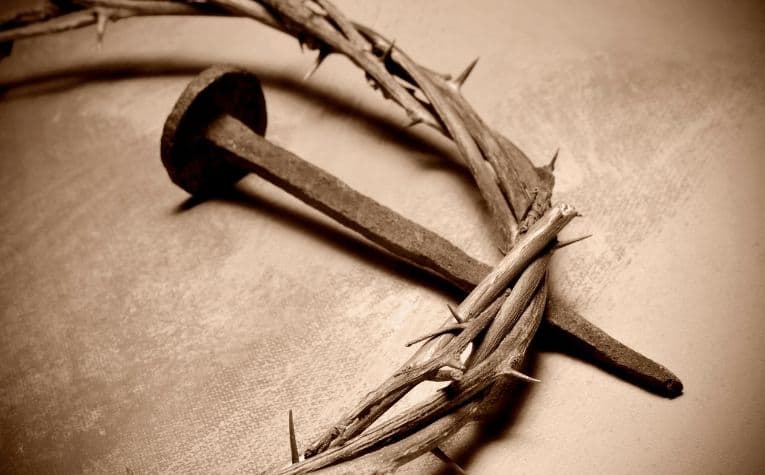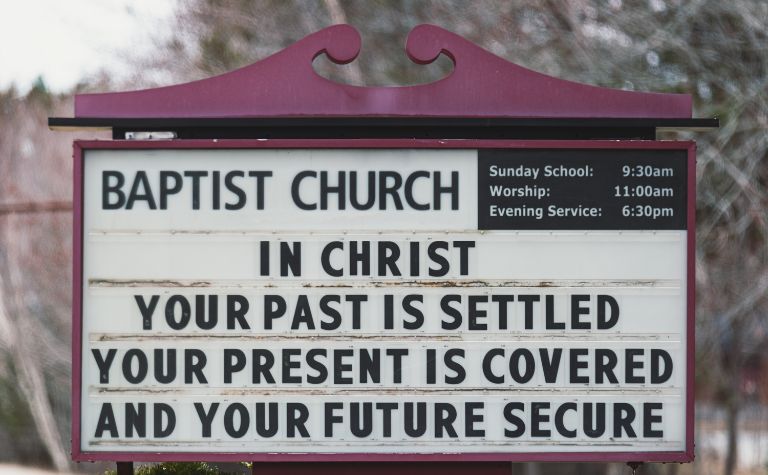The Baptist tradition and Roman Catholicism are two of the most prominent historical branches of the Christian faith. While the beliefs and practices of each church and its members have noteworthy similarities, they have significant differences, too.
Unlike Roman Catholicism, the Baptist Church doesn’t recognize the authority of the pope, it affirms the authority of Scripture over ecclesiastical tradition, believes justification is the result of declared righteousness, and that grace is imputed from Christ to sinners through faith, not the sacraments.
What are the differences between Baptist and Catholic beliefs and practices on these issues? Are the differences small and insignificant or much more substantial? Keep reading to learn more.
Also, see Roman Catholic vs. Protestant vs. Eastern Orthodoxy: Differences for more.

Baptists and Catholics Comparison
Historically, the Baptist tradition and Roman Catholicism are considered branches of the Christian religion. Some Baptists consider Catholics Christians; others Baptists don’t. Some Catholics think Baptists are Christians; other Catholics don’t. (Also see Southern Baptists vs. Baptists: What’s the Difference?)
Protestant Christianity, which Baptist denominations and churches are a part of, considers itself a truer or purer form of Christianity because Scripture is their authority.
Catholicism considers itself a truer and purer form of the faith because of its commitment to Scripture, the Pope as the Vicar of Christ on Earth, and the Eucharist.
| Baptist Tradition | Roman Catholicism |
|---|---|
| Name: The word “Baptist” comes from the practice of “believer’s baptism,” i.e., only professing Christians are baptized, not infants. | Name: The word “Roman” is derived from the city of Rome, Italy; “Catholic” refers to the universal Church. |
| Branch of Christianity: The Baptist tradition stems from the Protestant Reformation that sought to re-establish Scripture alone as authoritative; its roots go back to Christ and the Apostles. | Branch of Christianity: Catholicism traces its origins to Christ and the Apostle Peter (Matt. 16:18-19), who is believed to be the first bishop of Rome and Vicar of Christ on Earth. |
| Central commitments: Scripture alone is authoritative; justification is a declaration of God that occurs through the transfer of Christ’s righteousness to the sinner; salvation is by grace through faith in Christ alone. | Central commitments: The pope as Vicar of Christ; scripture and tradition are authoritative; justification involves forgiveness and sanctification; the sacraments are channels of God’s grace; Mass and the Eucharist. |
Note: There isn’t a single Baptist denomination. “Baptist” is best understood as a movement of like-minded denominations and churches that adhere to Protestant theology, emphasizing the believer’s baptism, the separation of Church and State, and the local church’s autonomy. The largest Baptist denomination in the world is the Southern Baptist Convention. (Also see What Does First Baptist Mean?)

Differences In Baptist and Catholic Beliefs and Practices
Baptists and Catholics have many similarities; for example, the doctrine of God. They generally agree about the reality of God’s nature (e.g., the Trinity), attributes (e.g., omnipotence, omniscience, and omnipresence), and moral standards (e.g., humility is good, covetousness is bad). Their theological disagreements, however, can be found in many areas. (Also see Do Baptists Believe in Mortal Sin?)
Important similarities
The Baptist tradition and Roman Catholicism agree on the outcomes of the first seven ecumenical councils of the Church.
An ecumenical council is a historically and theologically important gathering of Christian leaders to affirm and articulate biblical doctrine and refute heretical teachings.
The first seven ecumenical councils occurred after Christ from the 4th to the 8th centuries. Key doctrines were discussed, clarified, and summarized at these meetings, often in light of unbiblical teaching that surfaced in some churches. These councils didn’t create doctrine; they articulated it based on the teachings of Scripture.
| Name/Date | Doctrine Articulated |
|---|---|
| Nicea (325) | Defended the biblical teaching that Jesus is God against heretical teachings that argued otherwise. (Also see Do Baptists Believe Jesus Is God?) |
| Constantinople (381) | Affirmation of the Council of Nicea and defended the biblical teaching that the Holy Spirit is God. |
| Ephesus (431) | Defended the biblical teaching that Jesus is fully and fully man. |
| Chalcedon (451) | Defended and articulated the “hypostatic union,” which describes the combining of Christ’s human and Godly natures. |
| Constantinople II (553) | Defended and clarified the Council of Chalcedon and refuted heretical teachings. |
| Constantinople III (680-81) | Defended the biblical teachings that Christ, although he was fully God and fully man, had one will, not two. |
| Nicea II (787) | Affirmed veneration of icons, including physical images and representations of Christ and Mary. |
The Nicene Creed
The Baptist tradition and Roman Catholicism find agreement in the Nicene Creed, which was articulated at the first ecumenical council in the 4th century.
We believe in one God,
the Father almighty,
maker of heaven and earth,
of all things visible and invisible.
And in one Lord Jesus Christ,
the only Son of God,
begotten from the Father before all ages,
God from God,
Light from Light,
true God from true God,
begotten, not made;
of the same essence as the Father.
Through him all things were made.
For us and for our salvation
he came down from heaven;
he became incarnate by the Holy Spirit and the virgin Mary,
and was made human.
He was crucified for us under Pontius Pilate;
he suffered and was buried.
The third day he rose again, according to the Scriptures.
He ascended to heaven
and is seated at the right hand of the Father.
He will come again with glory
to judge the living and the dead.
His kingdom will never end.
And we believe in the Holy Spirit,
the Lord, the giver of life.
He proceeds from the Father and the Son,
and with the Father and the Son is worshiped and glorified.
He spoke through the prophets.
We believe in one holy catholic and apostolic church.
We affirm one baptism for the forgiveness of sins.
We look forward to the resurrection of the dead,
and to life in the world to come. Amen.
Additional councils: Catholicism recognizes 15 other councils that protestants, including Baptists, don’t. These councils occurred from the 9th century to the 21st century.
The Council of Trent (1545-1563) responded to the Protestant Reformation, affirming the Church’s views on Scripture, sin, justification, the sacraments, purgatory, indulgences, and more. (Also see Do Baptists Believe in Original Sin?)
Key differences
| Baptist Tradition | Roman Catholicism |
|---|---|
| Human Leader: Baptists don’t believe any single human being is God’s representative on Earth; no Baptist denomination or church recognizes the Pope as the Vicar of Christ or head of the Church. | Human Leader: Catholicism holds that the Pope is the Vicar of Christ and the head of the Church on Earth, an office that dates back to the Apostle Peter. |
| Ordinance/sacraments: Referred to as “sacraments” or “ordinances,” believer’s baptism (but not infant baptism) and the Lord’s Supper; Baptists don’t believe sacraments are channels of grace. | Ordinance/sacraments: Referred to as “sacraments,” adult and infant baptism, confirmation, the Eucharist, penance, anointing, ordination, and marriage are channels of grace. |
| Believer’s baptism: Sometimes referred to as “credobaptism” (credo = “I believe”), the sacrament is for professing believers who have trusted Christ for salvation. | Infant baptism: Sometimes referred to as “paedobaptism” (paedo = “child”), children of Christian parents are baptized to cleanse them of original sin and regenerate them. |
| The Lord’s Supper: Also called “communion,” most Baptists believe consuming the bread and cup is a memorial of the atonement of Christ. | The Lord’s Supper: Also called “the Eucharist,” it is a memorial in which the elements become the body and blood of Christ (i.e., “transubstantiation”). |
| Saints: Baptists believe the word “saints” (e.g., 1 Cor. 1:2) in the New Testament refers to Christians; they don’t believe in canonizing believers but honor and value their service to God and the Church. | Saints: Believers who have lived with great virtue and honor may be considered for canonization, which believers living on Earth venerate, in part through asking for prayers and blessings. |
| Mary: Mary was a virgin when she gave birth to Jesus. She is to be respected, honored, and seen as an example of obedience, holiness, devotion, and love. | Mary: Mary was a virgin when she gave birth to Jesus. She lived a sinless life, reversed Eve’s disobedience, was a perpetual virgin, was raptured to heaven, and is an advocate and co-mediator. |
| Religious orders: The Baptist tradition doesn’t include religious orders. | Religious orders: The term describes men (e.g., priests) and women (e.g., nuns) who have fully devoted themselves to a certain form of religious life, which includes poverty, chastity, and obedience |

Brief History of Catholicism and the Baptist Tradition
The history of the Catholic Church is the story of Christianity until the Eastern Orthodox Church split from it in the 11th century and the Protestant Reformation in the 16th century.
Persecution and expansion marked the first few centuries of the Christian faith. In subsequent centuries, the Church became the most significant institution in the Western world during the Middle Ages.
Roman Catholicism experienced a split in the 16th century. The Protestant Reformers, led by men like Martin Luther of Germany, Ulrich Zwingli of Switzerland, and John Calvin of France, challenged the Catholic church on a variety of issues, such as indulgences. The Protestant movement attempted to call the Church back to Scripture.
The Baptist tradition has roots in Europe, but it blossomed in America. In the 17th century, Roger Williams’ church in the Northeastern United States welcomed Christians who mainline denominations considered outsiders.
The Baptist movement in America championed the separation of Church and State, which aligned strongly with the nation’s value of freedom. The local church’s autonomy also signaled a departure from previous centuries in Europe when politics and church blurred. (Also see Can a Baptist Marry a Catholic?)
Do Baptist and Catholic Churches Ever Work Together?
Yes. There are many social issues that Baptist and Catholic churches value. While their theological disagreements remain, members have found common ground on a variety of issues. Examples are numerous:
- The elimination of racism is overt and subtle expressions
- The support of single mothers and women who find themselves unexpectedly pregnant
- The prevention and alleviation of homeless, poverty, and hunger
- The eradication of sex trafficking
Please see the related articles below.
References:
[1] Source
[2] Source
[3] Source
Related Questions
Baptist and evangelical churches are numerous in America, and the influence of each tradition has also spread to different continents and countries. As a result, many people have heard the terms...
The Baptist tradition is one of the largest branches of Christianity in America and around the world. Historically, some Protestant denominations have prohibited their members from activities like...
